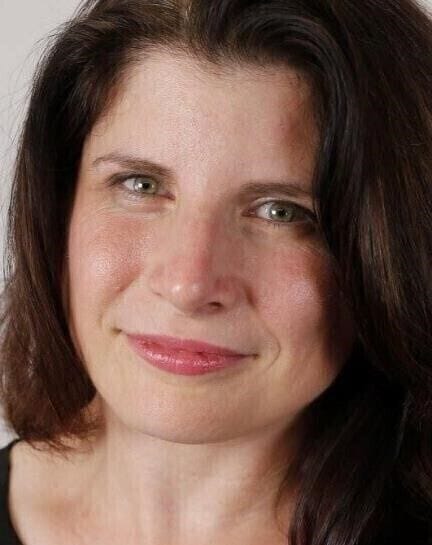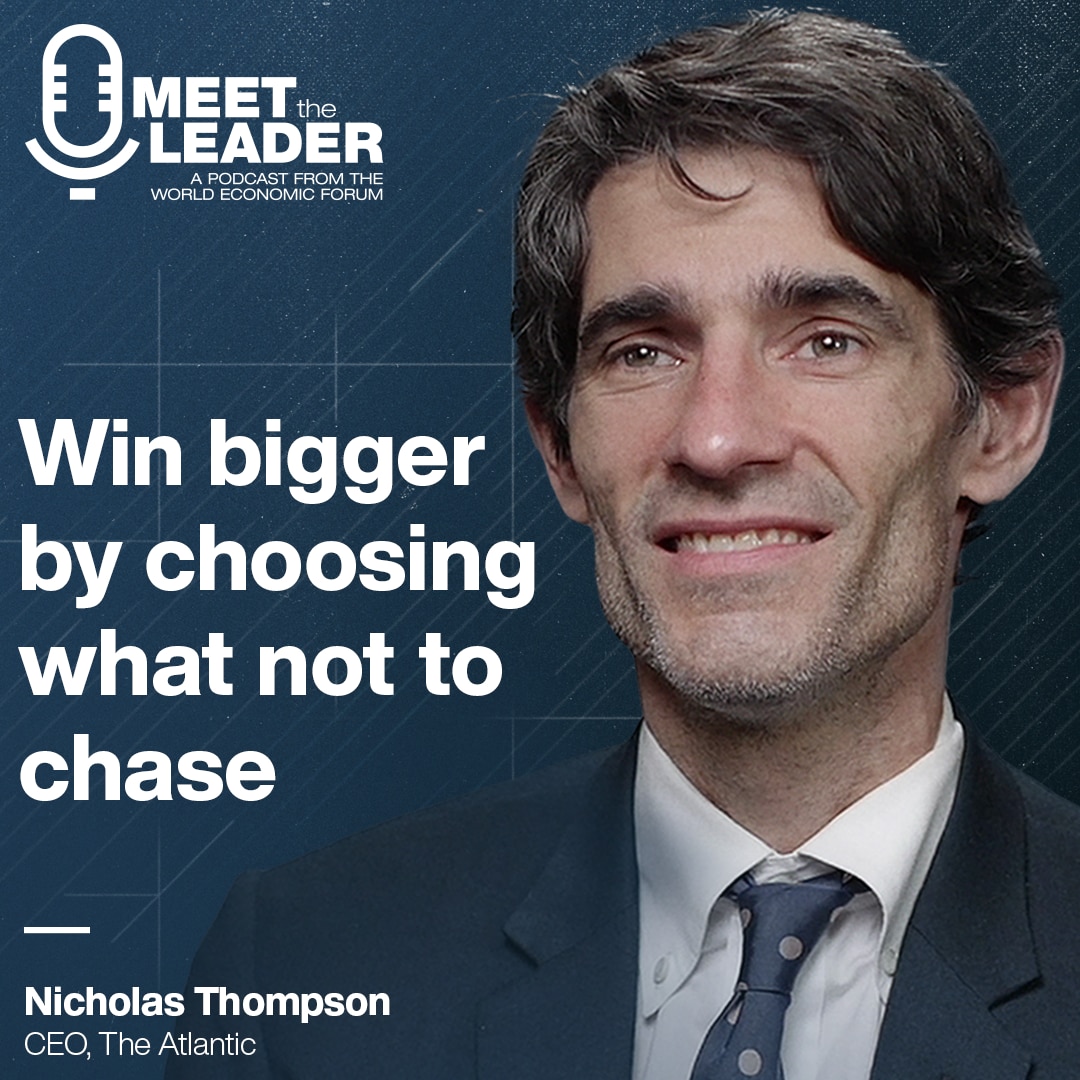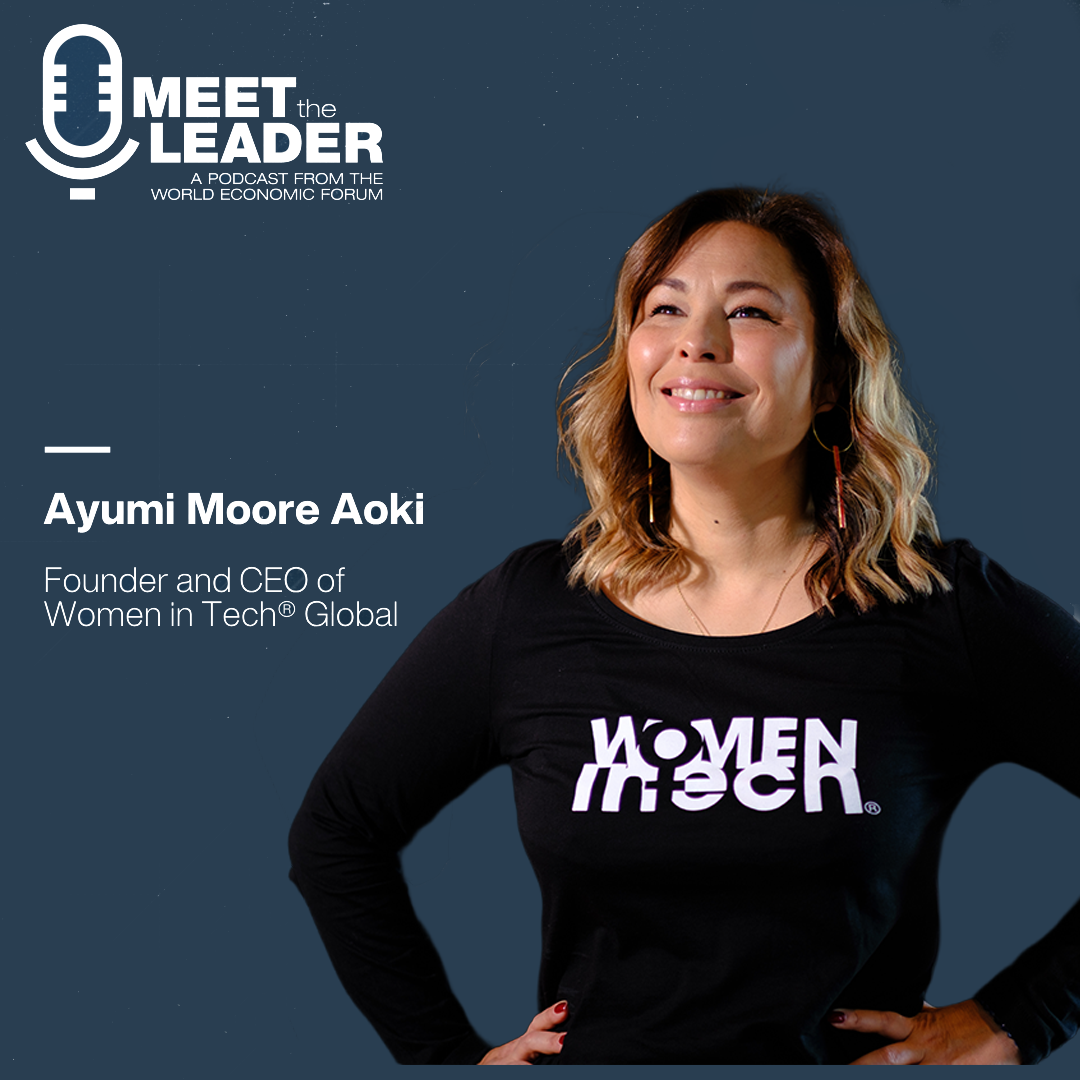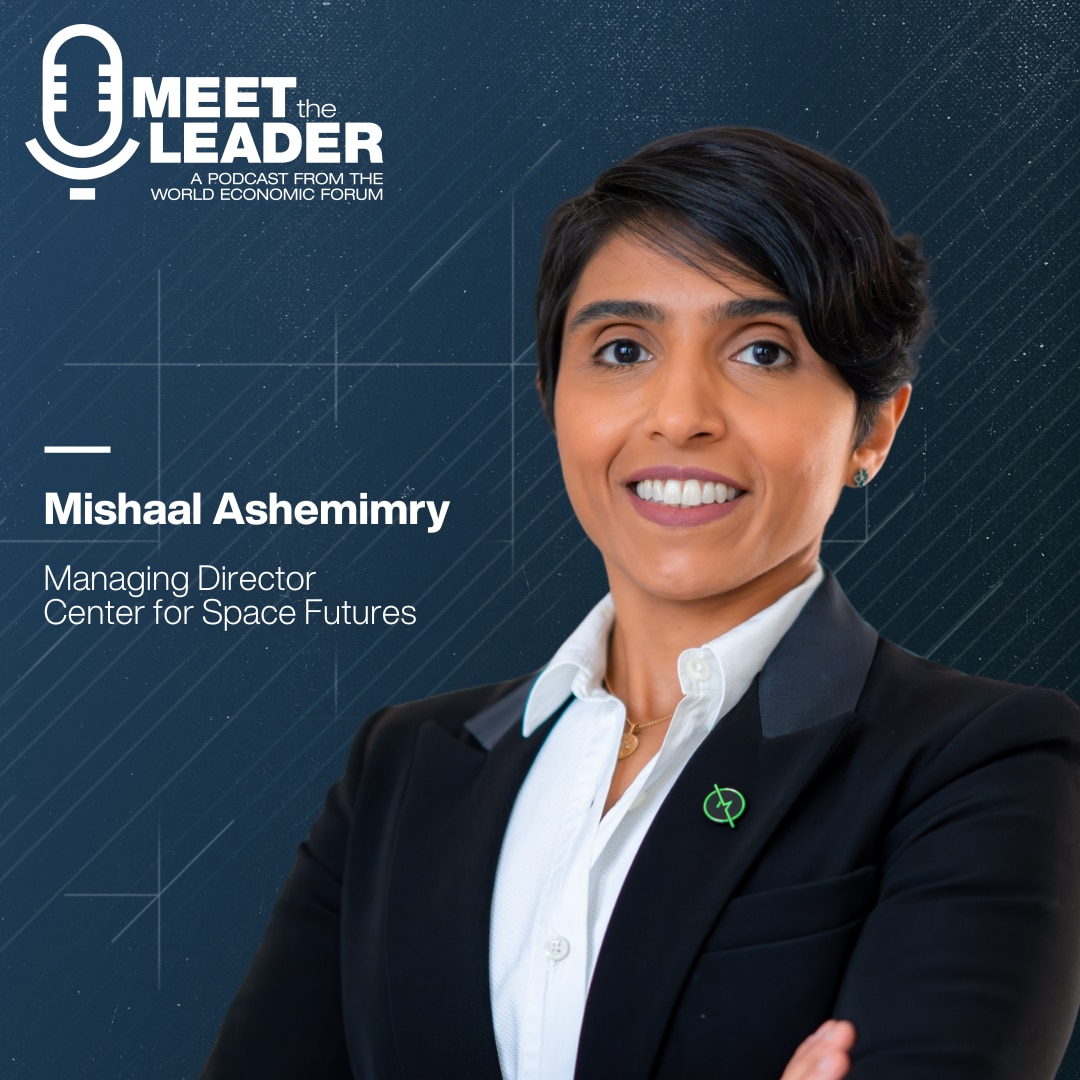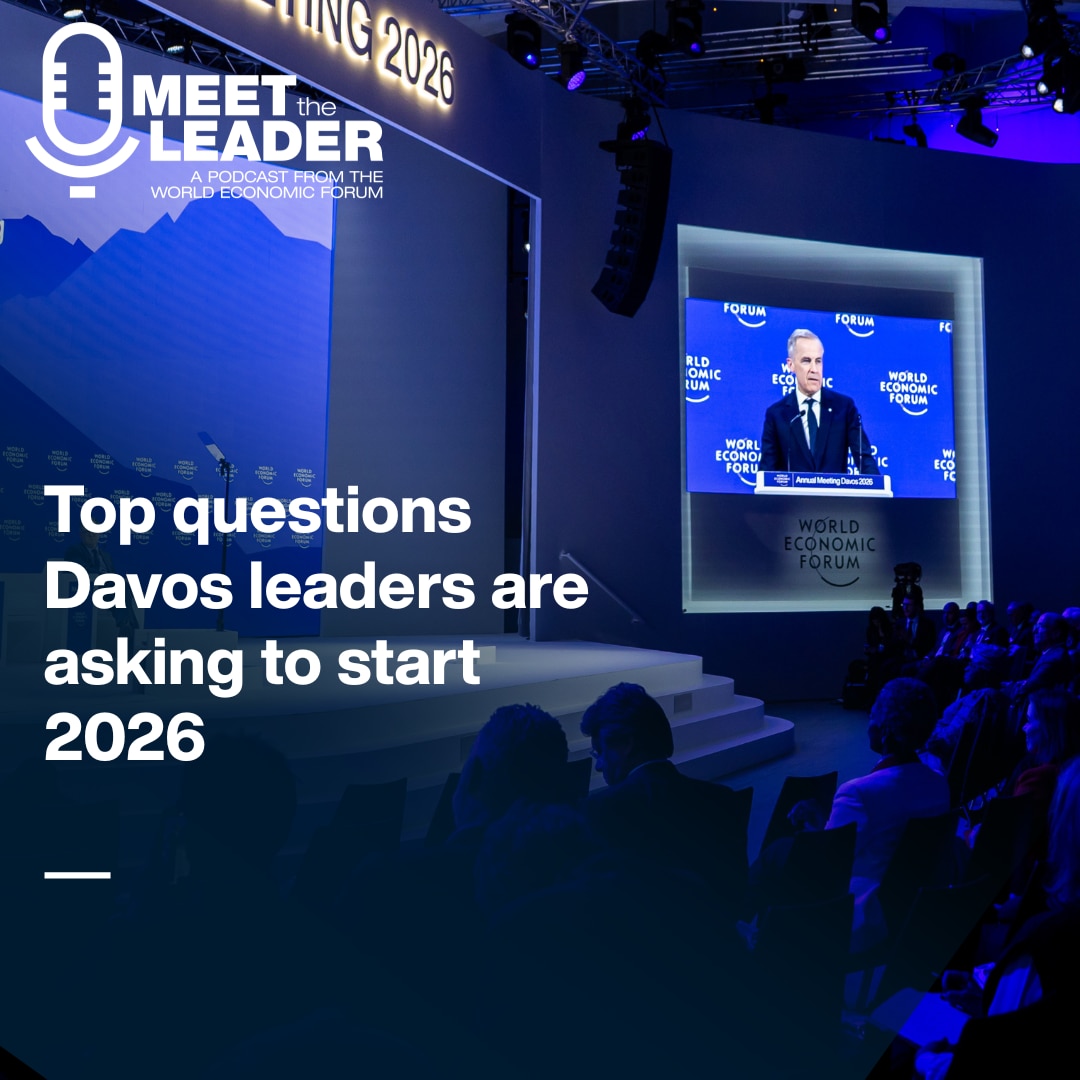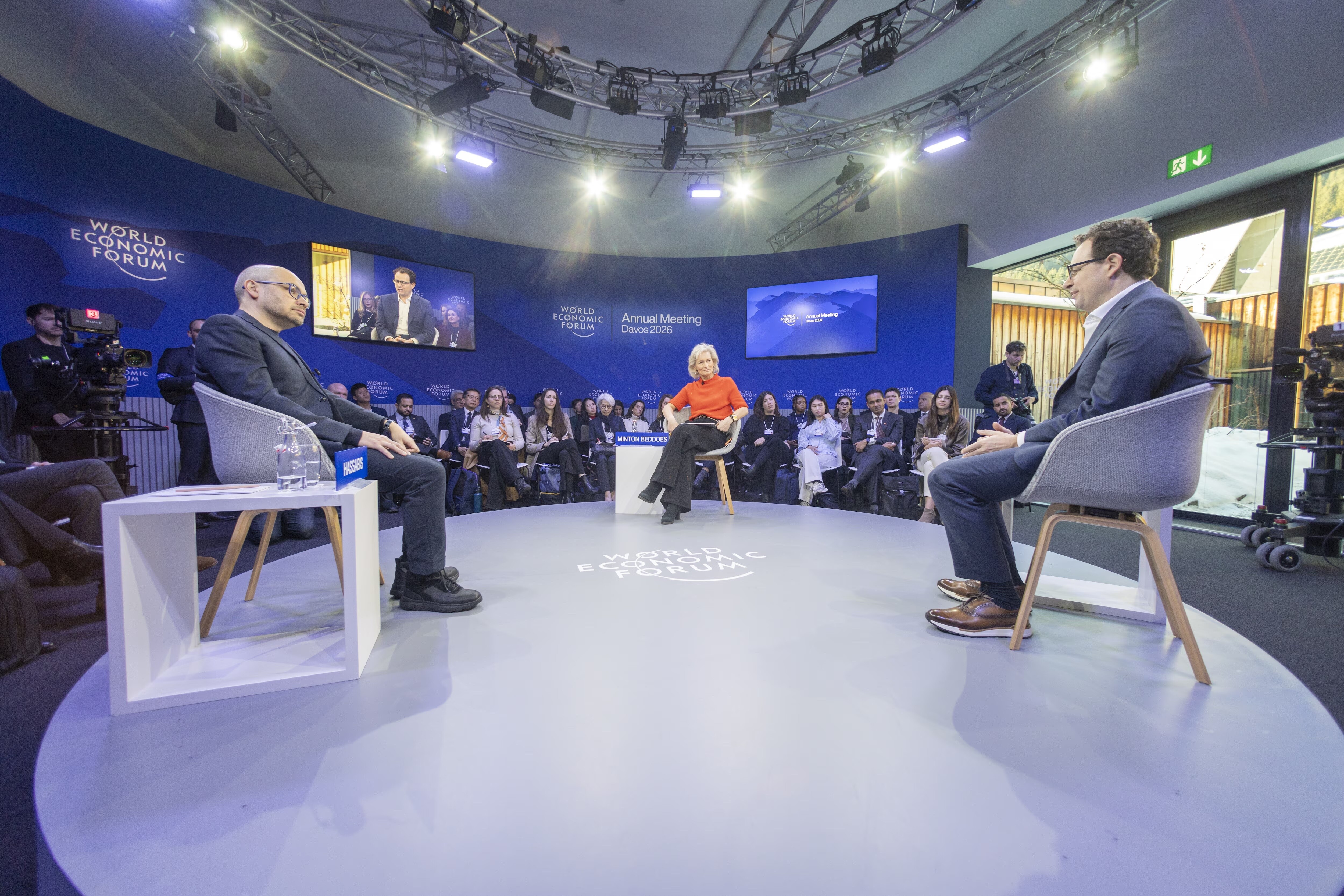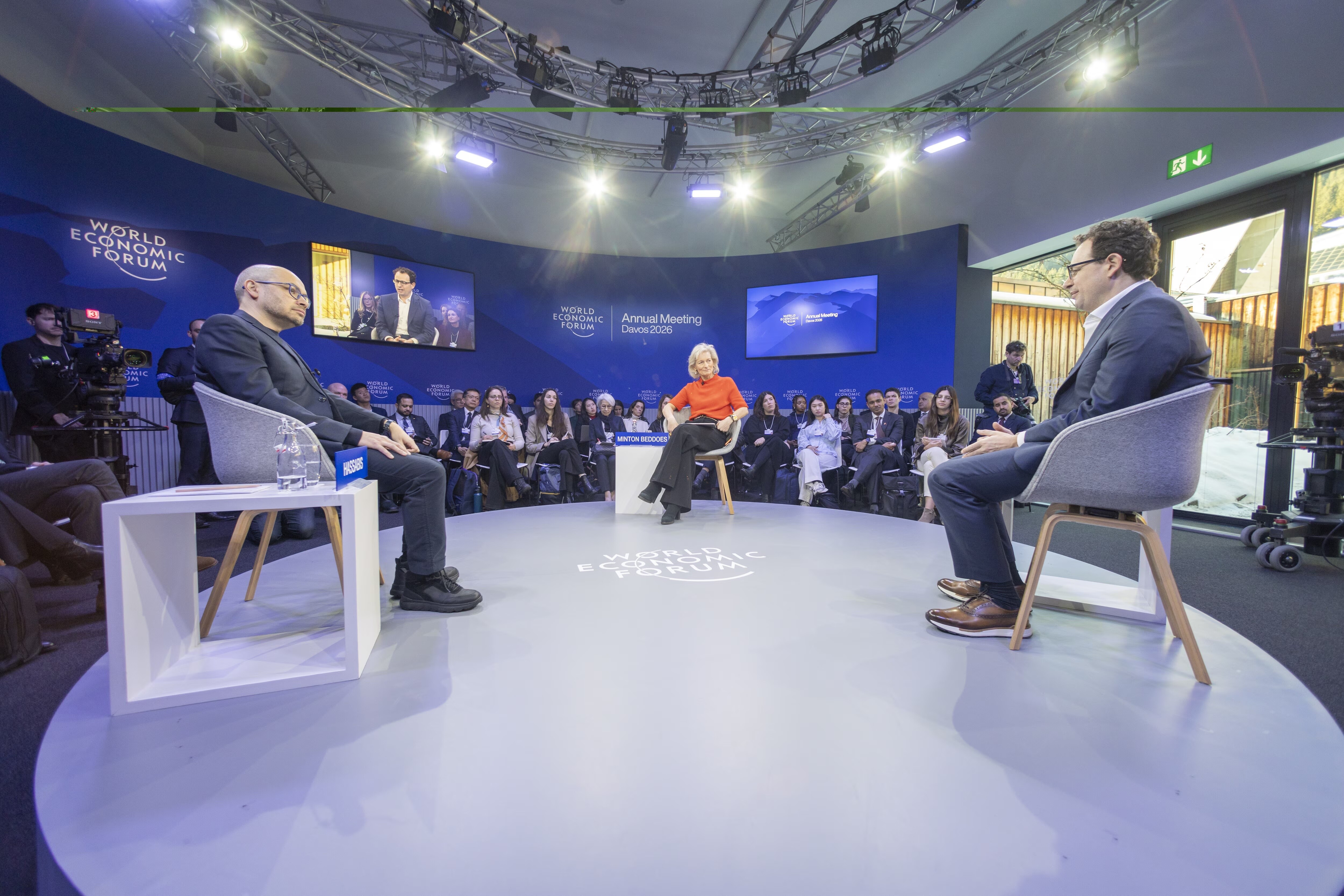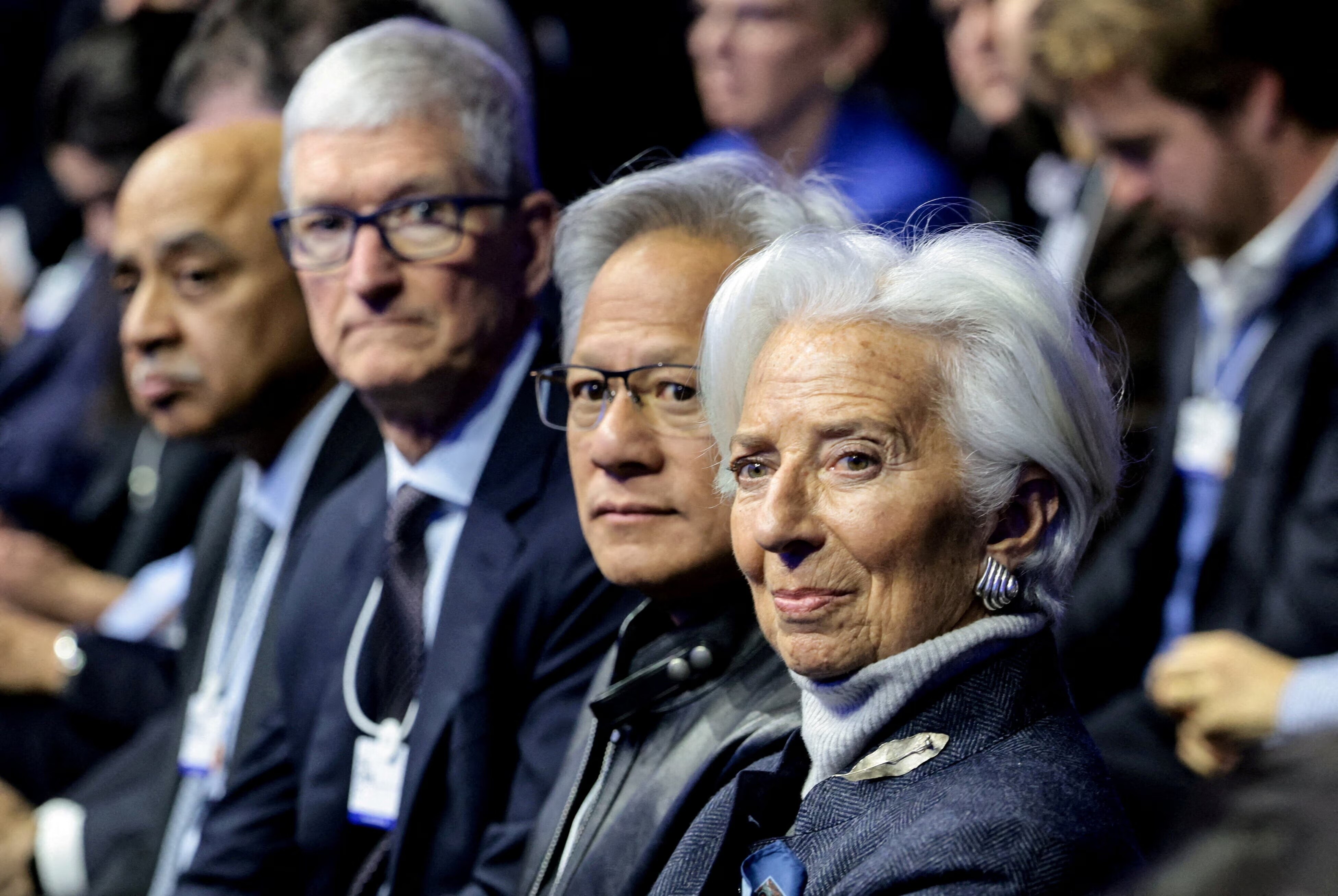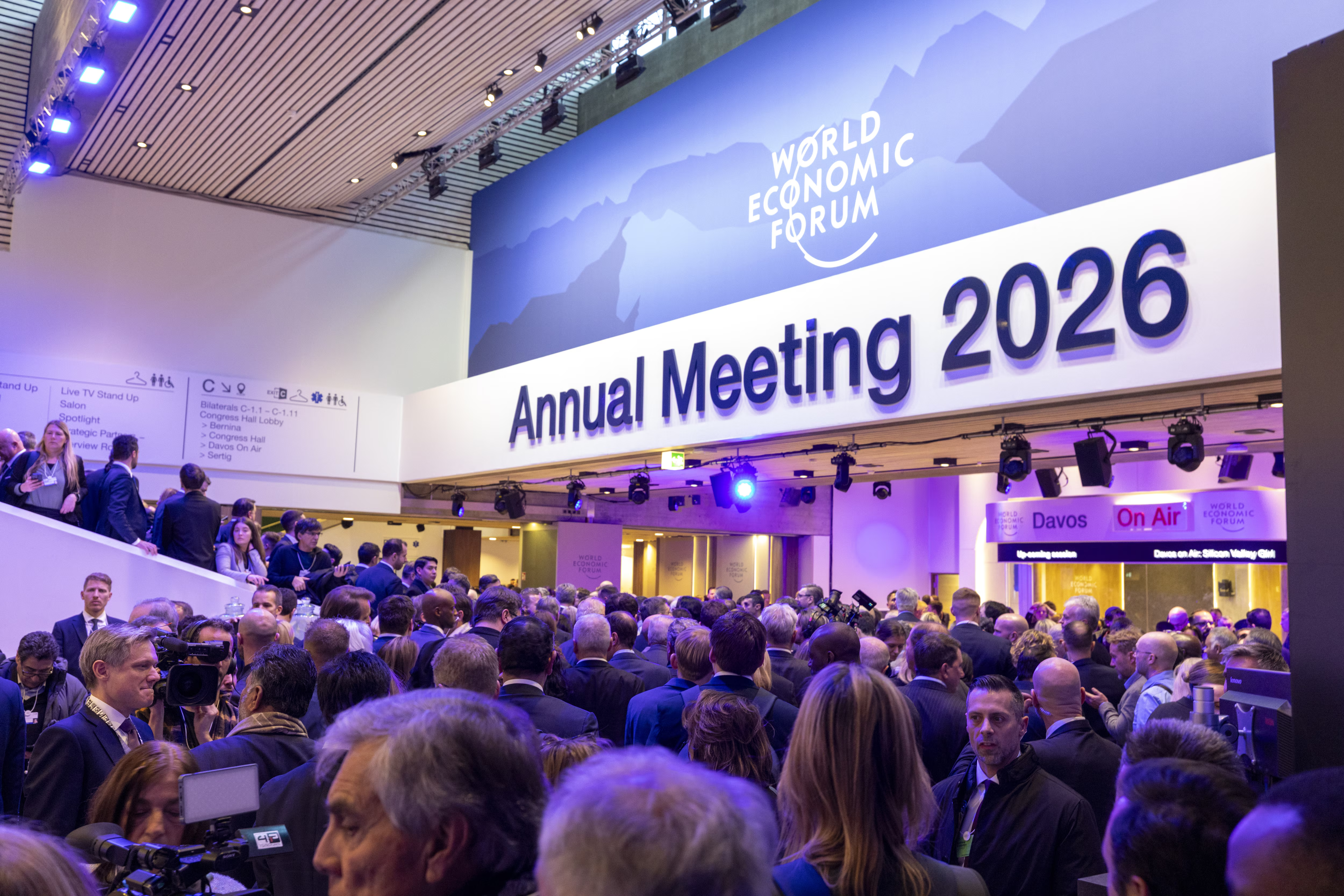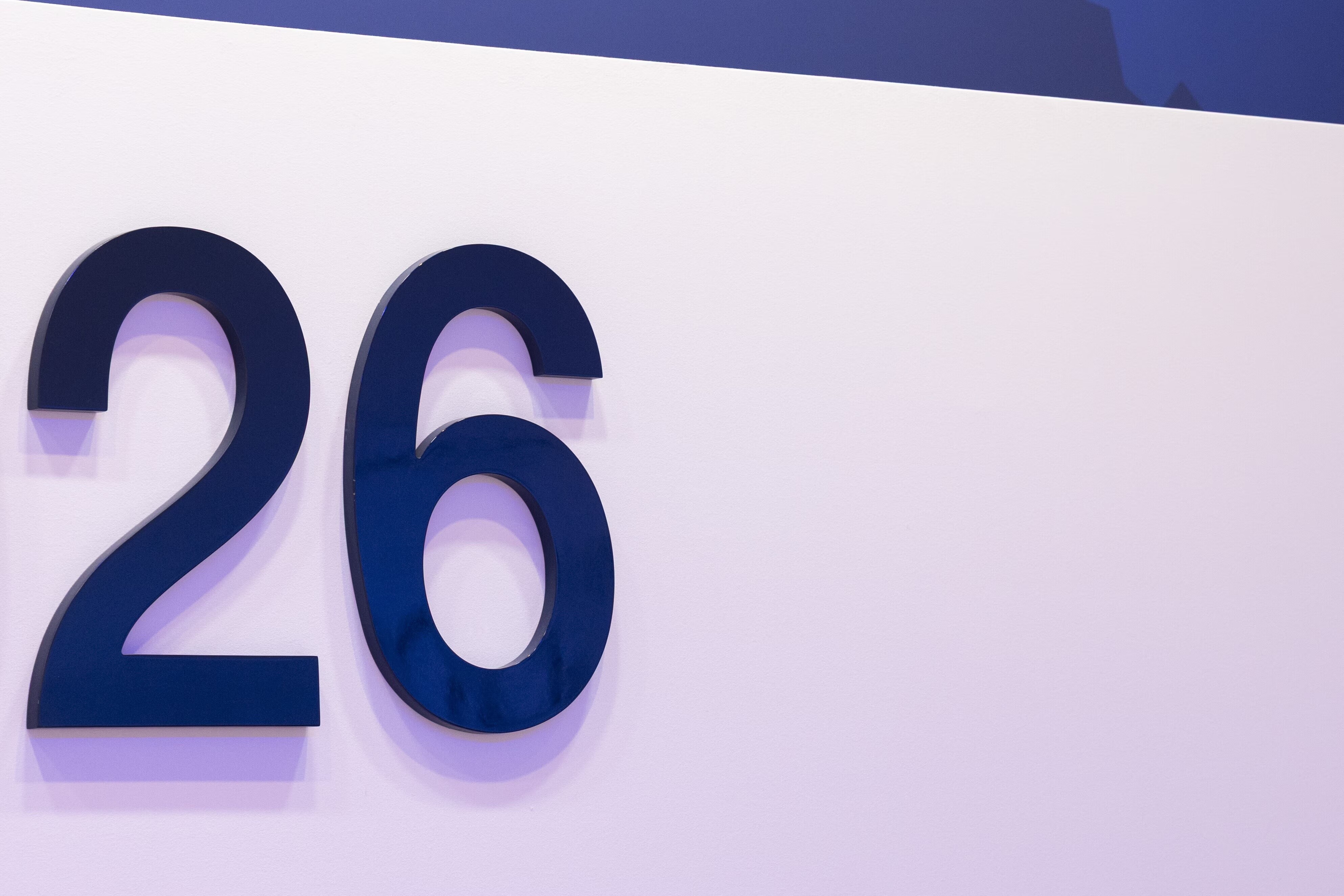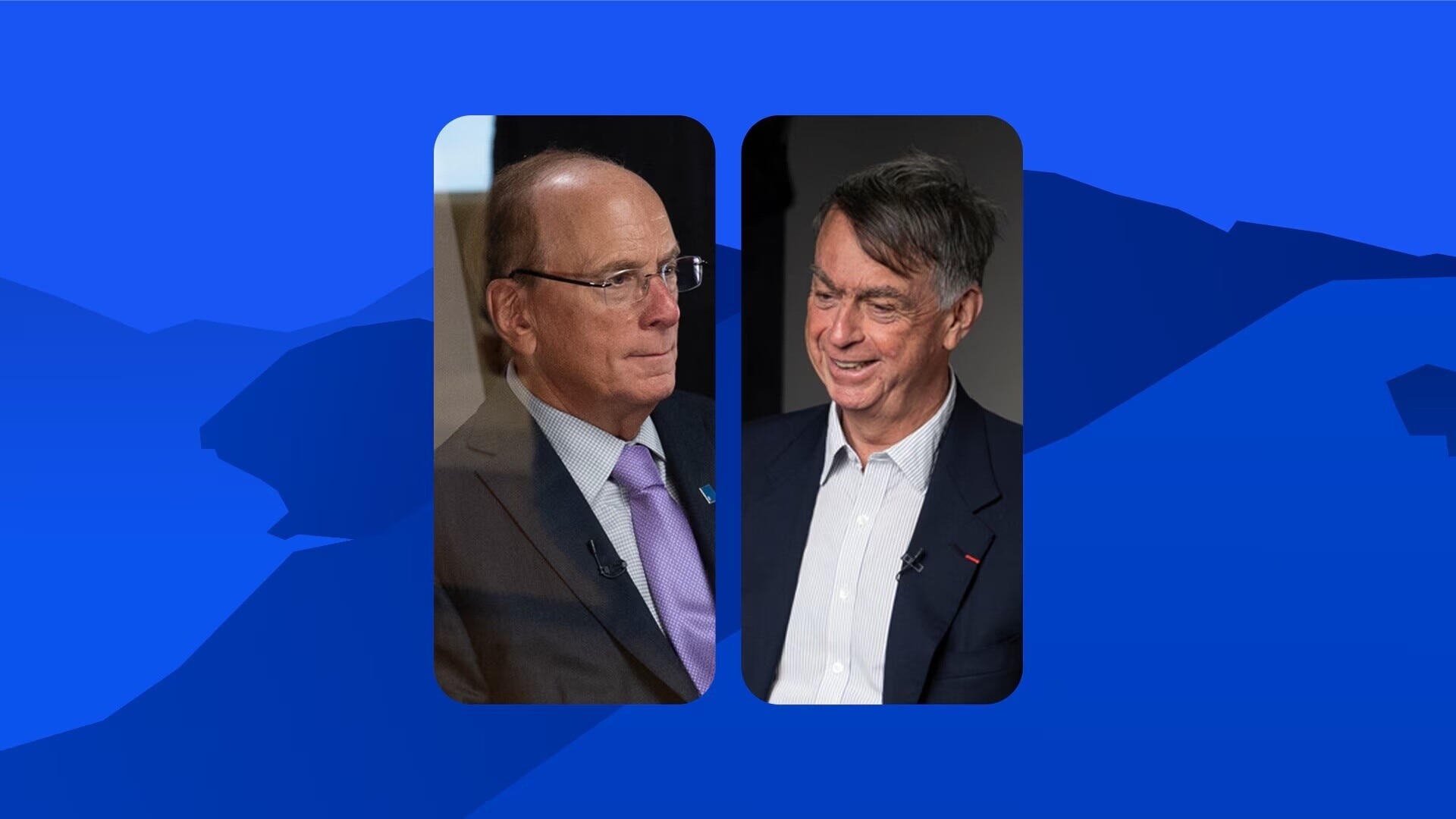Skills are changeable - passions are not: Boom Supersonic CEO Blake Scholl
Transcripción del podcast
This transcript, generated from speech recognition technology, has been edited for web readers, condensed for clarity, and may differ slightly from the audio.
Blake Scholl, Boom Supersonic: It was very clear to me on Day Zero of Boom that I did not have what it takes to do this. I'd have to go get what it takes to do it.
Linda Lacina, Meet The Leader: Welcome to Meet the Leader a podcast where top leaders share how they're tackling the world's toughest challenges.
Today's leader, Blake Scholl. He's the CEO of Boom Supersonic, and he'll talk about the passion that changed his life and how supersonic aviation could finally make sustainable flights a reality.
Subscribe to Meet The Leader on Apple, Spotify and wherever you get your favourite podcasts. And please take a moment to rate and review us.
I'm Linda Lacina from the World Economic Forum and this is Meet the Leader.
Blake Scholl, Boom Supersonic: Capabilities are very changeable, knowledge is changeable, but passions are not.
"Capabilities are very changeable, knowledge is changeable, but passions are not."
”Linda Lacina, Meet The Leader: Imagine flying from Seattle to Tokyo in four and a half hours, crossing the Pacific in less time than it takes to cross the Atlantic today. That is possible with supersonic flight -- flights that are two times faster than any airline provides today. Blake Scholl's company Boom Supersonic is working on just that kind of marvel with tech that connect us to work or loved ones or easily or economically -- and thanks to sustainable aviation fuel -- more sustainably.
Blake talked to me at the Annual Meeting in Davos about the opportunity that supersonic flight can provide.
He also talked to me about his own unique path to aviation CEO. With roles in software engineering and ad tech, but with a singular passion for aviation technology and aviation economics. Immersing himself in the sector taught him that knowledge and skills are adaptable and changeable and the surprising ways they can support our passions, whatever they might be.
He'll talk about all that. But first he'll get us started with the last super-fast flight experience, you might know -- the Concorde -- and how Boom Supersonic can take that further.
Blake Scholl, Boom Supersonic: The Concorde was an absolute technical marvel, technically really far ahead of its time, but it was born out of the Cold War era drive to build something to show national prestige. Not built with a sustainable economic model and not built with a sustainable environmental model. So a $20,000 ticket was what it was on Concorde for the vast majority of people. It's like a bucket list item. It's not transportation.
And so fast forward to today. It's been more than half a century since Concorde was designed with drafting paper and slide rules and wind tunnels and no computers. Today we have carbon fibre composites. We have digitally optimised design, we have sustainable aviation fuel. We can build a new generation supersonic airplane that is three quarters less expensive to operate than Concorde was. And what that means is tens of millions of people will be able to benefit from supersonic travel aboard an Overture. And ultimately we want to make supersonic more affordable than economy so that everybody who flies can benefit from speed.

Linda Lacina, Meet The Leader: What is maybe the opportunity with supersonic travel that maybe people don't realise or they're not thinking enough about?
Blake Scholl, Boom Supersonic: I think it helps to look back at what happened. We went from the propeller age into the jet age, and that was in the late 1950s, early 1960s, and that was the last time we really had a mainstream speed up in flight.
And you might think, oh, faster flights, that means less time on airplanes. But actually as a civilisation we spend several times more time on airplanes because there were so many more possibilities in our world. Hawaii was not a tourist destination before the speed of the jet. In the 1960s, you think of the ethos of Walt Disney World where it was about exposing people to other cultures in many ways because there was no capability for international travel for everyday people.
And as we speed up travel, what we're going to see is that happens again. We will choose to connect across continents when we might otherwise stay closer to home. I think this is one of these technologies that -- I think any deeply great technology has its most powerful benefits, sort of second order effects. Meaning, oh, flights got shorter. But that's the first order. The second order is: what do we do with that? And, you know, things like Hawaii becoming a tourist destination or Nike getting started thanks to the ability to build a global supply chain or even like the Beatles, being able to take the first world tour. I don't think anyone would ever have leapt from a jet engine to music becomes global.
The most exciting things about supersonic travel will be second order effects that we're not smart enough to predict or imagine.
”I think the most exciting things about supersonic will be second order effects that we're not smart enough to predict or imagine. But what happens when this increased connectivity, increased accessibility comes out for millions of people and eventually billions of people? What do we do with it? What do we create? What experiences do we have? What happens when our kids grow up not just having read about other cultures in textbooks or in YouTube videos, but having broken bread on every continent with multiple cultures? What does that do for the future? I'm very, very excited and very motivated to make that a reality.
Linda Lacina, Meet The Leader: And your planes also only use sustainable aviation fuel, correct?
Blake Scholl, Boom Supersonic: That's right. Yeah. So it turns out we don't have to choose faster or sustainable. We can actually have both at the same time. And ultimately, I think every long haul airplane is going to be designed around sustainable aviation fuel. But today that's not the case. And Overture is the first airliner designed from the ground up to run on 100% sustainable aviation fuel on a net zero carbon basis. And so this is not just a capability we're putting on the airplane, it's something we're asking our customers to actually live in to an operation. So United, for example, which was the first airline to order Overture publicly committed to operate them on a net zero basis on sustainable aviation fuel. And this is this is coming in and 2029, not in 2050. So we can have flights that are faster, we can have them and we can have net zero aviation 20 years ahead of Paris [Paris Climate Accords].
Linda Lacina, Meet The Leader: And for those who aren't familiar, can you define sustainable aviation fuel?
Blake Scholl, Boom Supersonic: Sustainable aviation fuel is basically synthetic jet fuel that is chemically very similar to what we would pump out of the ground, but is is produced in sustainable ways. And there are lots of lots of ways to do it. People often think of the older forms that are biofuels, which have some real trade offs. They compete with crops for access to agricultural resources. So there are a lot of issues with biofuels, but there's latest generation since synthetic, sustainable aviation fuel that's actually CO2 based. And that is really quite powerful because it starts with CO2 in the atmosphere and basically using green electricity converts that to high density liquid fuels. We don't compete with crops. We can be 100% net zero if we do this the right way. We're building on a definitionally renewable resource. If we run out of atmospheric carbon, I guess we've solved the problem.
Linda Lacina, Meet The Leader: With Boom, what are your plans to reach net zero? What are your commitments?
Blake Scholl, Boom Supersonic: We've committed to net zero by 2025. It's one of these things that starts easier when the scale is smaller. So, for example, we're breaking ground actually next week on the Super Factory in Greensboro, North Carolina, we're going to build Overture and, well, it's going to be LEED certified. It's going to be renewable energy from day one. And we have an advantage as a new entrant of on day zero, the scale is small and we get to build entirely new infrastructure from scratch. But it gets more challenging over time, especially as we start to think about scope three emissions. As we're building, you know, we're building a supersonic airplane and what fuel our customers use is going to really matter. And that's why our commitment to sustainable aviation fuel and our the way we also ask our customers to join us in that commitment is critical to, to get into to net zero. We believe we can get there like 25 years ahead of ahead of Paris.
Linda Lacina, Meet The Leader: Overture. It has only will carry 65 passengers. Who's a typical customer for Overture.
Blake Scholl, Boom Supersonic: So Overture is designed to be very profitable for airlines at the same fares that are charged in business class today. So the initial audience is primarily people who fly business class internationally. It turns out that while that's only about 20% of passengers for international airlines, it's more than half the revenue and about 80% of the profit dollars. So this is, on version one, already targeting the economically most significant part of air travel. And we're taking everything we learn from the all-business class supersonic airliner, and we'll be using that to innovate towards Overture 2, Overture 3, which we'll be able to do premium economy and eventually economy supersonic flight.
Linda Lacina, Meet The Leader: And so with all of this, too, we've got sustainable aviation fuel. We've got the just the idea of supersonic travel. What is needed to, you know, to to scale this even more widely?
Blake Scholl, Boom Supersonic: We need to invest in the infrastructure for making sustainable aviation fuel. That's one of the biggest challenges facing the entire industry today. I think there's a broad recognition that that SAF, sustainable aviation fuel, is the way to decarbonise long haul travel, and we're able to build it in small scale. But today, supply and demand are totally out of whack. It's actually, in many cases, inexpensive to produce. But the market prices are very high because we simply don't have enough. And so we need to it needs significant capital investment in the supply chain for creating these fuels so that we can have plenty.
But there's lots of reason to be optimistic about that. And in fact, we put out a report last year on sustainable aviation fuel comparing the trajectory needed for its scaling into what actually happened with wind and solar. And if we can remember back a few decades, what was everyone saying about wind and solar? Won't scale, too expensive, uneconomic, unreliable. And now, in many places, wind and solar are the most economic sources of energy available. So sustainable aviation fuel follows much the same trajectory. There's a lot of good reason to believe it can, if we take the right actions, it allow us to have plenty of fuel at great prices.
But it needs it needs the right incentives, just the way we incentivise solar and wind and the early days. And it needs all of us to take a take a longer view so we can look at what's the price at the pump for SAF right now and you know, freak out. But if we remember the way technologies develop and if we look very closely at the fundamental unit economics, then there's a lot of reason to be bullish and there's a lot of reason to invest.
Linda Lacina, Meet The Leader: I want to talk a little bit about your background. So you dropped out of high school as a young man, in part because you said that high school had nothing left to teach you. And I think that's a really interesting thing. How can that idea, that approach help anybody that when it doesn't serve you anymore, that you move to something else?
Blake Scholl, Boom Supersonic: I think people underestimate what they can learn and what they can teach themselves if they are motivated and focussed.
I was very fortunate as a as a kid. My parents sent me to some really awesome summer camps. Like I hated my like normal run-of-the-mill Midwestern U.S. school experience. But I would go to these summer camps, started like learn to program or I'd learn how digital circuits worked.
And like that stood in my mind is like, this is what it really means to learn. This is exciting. And I'm around people who feel like my peers. And so Carnegie Mellon had this really visionary program where you could apply as a junior in high school, write an essay on why you're kind of done with high school, and then they would throw you in as a freshman if they if they bought your essay.
And I feel incredibly fortunate to have stumbled across that opportunity and been able to take advantage of it. And it's a lesson that I think plays forward in my life. Like I don't have the resume to build supersonic airplanes. I'm a software engineer by training. I'm like the ad tech guy from like Amazon and Groupon. But I spent a year kind of just teaching myself the fundamentals of airplane design and airplane economics. And it turns out, like, I can learn that.
And I think a lot of people have a very self-limiting mindset that this is normal in our culture of you go to school and that's where you pick your field and then you become an expert in something and then your expertise just gets more and more and more narrow. And that's certainly a model that can work. But my experience is that skills and capability are very changeable. Knowledge is changeable. But passions are not. And it's much more powerful to follow your passions and let your knowledge and skills follow where your passion takes you.
Linda Lacina, Meet The Leader: You mentioned also Groupon and Amazon. Let's talk about that. One of your first experiences at a startup was with a coupon company.? What does that teach you? What did that experience teach you about entrepreneurship?
Blake Scholl, Boom Supersonic: Work on the most ambitious thing that you can think of that motivates you is my biggest lesson. And to unpack that a little bit, as an entrepreneur, no matter what I'm doing, I like work at my personal red line. I'm giving whatever I'm doing, everything I've got, and then a little bit.
Work on the most ambitious thing that you can think of that motivates you.
”And when I was working on my my first company, which was as a mobile ecommerce company, it was literally a barcode scanning game. Like if we like order all the businesses in the planet, like most impactful, least impactful, like I might be setting a new level and I would get up in the morning. I think this is really hard. I'm working really hard and I don't really care about what it is we're we're creating here. And so we had an opportunity to sell the company. I took it because it just wasn't worth it. And so on.
Company number two, which became boom. I wanted to work on the most motivating thing, the most impactful thing, that was not impossible because I never wanted to get up in the morning and think, why am I doing it. And, you know, at Boom, we've had we've had some high highs, we've had some low lows. And, you know, we're started, but we're certainly not finished. I'm sure they're going to be many more challenges along the way. And it's that deep belief and mission that keeps me going, no matter what the challenge is.
Linda Lacina, Meet The Leader: You mentioned you worked at Amazon and you were a software engineer there. What did you learn from Jeff Bezos' leadership in the way that that company was organised?
Blake Scholl, Boom Supersonic: Amazon for me was like a first love that was really good and I didn't know how good I had it until until after I left and experienced other corporate cultures and realised what a well-run company Amazon is.
Learned a ton of things there. Like I got to have a multi hundred million dollar PNL when I was 24 and it was pretty insane. They'd let me do that because I didn't really know what I was doing. But one of the things that that really stood out in their culture versus other cultures I've seen is intense focus on long-term decision making with short term excellence. And so the way companies react to end-of-quarter pressures I think is very telling for corporate culture. And, you know, Amazon would always make the long term calculus and be willing to have short-term cash flows be lumpy in service of long-term achievement of goals.
And, you know, and I watched, you know, other companies panic when a quarter is soft and do things that ultimately prop up the current quarter but undermine the long-term potential.
One of the most important things to get right in a corporate culture is how to focus literally every employee on making long-term decisions that are best for the entire organisation and its goals while still having accountability for short-term excellence.
Linda Lacina, Meet The Leader: In, you know, entrepreneurship. There's plenty of plenty of ups and downs, right? It's natural to have these feelings where you hit a wall and you get through it, you know, but there's this moment where you aren't sure how. Can you tell me a little bit about a moment like that for you and how you got through it?
Blake Scholl, Boom Supersonic: I have so many moments like that. Let's see the worst. I'll be a little vulnerable. There are business crises and business crises can be bad. The worst crises are personal. And when I get up in the morning to look in the mirror and think like, "Am I up to the challenge?"
To share a story of one when when Boom was a baby company that was still in my basement like literally I think we had eight or ten employees. I was basically the only investor in the company and I kind of put a huge fraction of my life savings into this. I sort of gotten all in and it was is the point of, if I if I didn't find a way to raise money, like I'd bankrupt the family or go out of business or both.
And a potential investor came in and basically said, I want to recap your company and I think I'm a better CEO than you are. So you should you should basically hand the company over to me and I'll raise a bunch of money and I'll run this thing that you created.
And it was a real gut-wrenching struggle for me because I was like, "What if he's right?" And I ended up calling one of my my closest mentors and friends. I was like, "What should I do here?" Like, I deeply want the business to work, but also this is like my passion. And and he said, Look, what would you do if you sold it? And I was like, I have no idea. I'd like want to take the money and restart the same thing.
The realisation I had was there is no way a priori to say, "Can I do it or not?" Can't know. The only way to know what I can do is to just go all in and don't worry about the whether I'm going to succeed, worry about how to succeed. And if it works, then fantastic. And if it doesn't work, then I found my limit and I know I gave it my all.
That crisis was really a crisis of confidence, of self-confidence, was one of the most challenging. But again, that that mission and kind of wanting to find my own limits that's what it together with a really fantastic friend. It's what got me through.
Linda Lacina, Meet The Leader: I think a lot of people have probably had those same crises of confidence. What was it like for you, though? What did it feel like?.
Blake Scholl, Boom Supersonic: It was horrible. Really horrible. People don't talk about this, I suspect that it's actually relatively common. But we're supposed to look as founders like we've always got it all together and we're super confident. But challenges are big and sometimes, you know, it was very clear to me on day zero of Boom that I did not have what it takes to do this. I'd have to go get what it takes to do it. I have to reinvent myself. And the question is, would I be able to do that successfully. And so there's moments where, it's like, okay, I'm clearly encountering a challenge of the sort. I'm not walking in with the pre-existing experience or knowledge of how to solve. Those are hard. And the underlying best lesson I've gotten from that is to not be focussed on what I already know how to do, but have underlying -- build underlying confidence in my ability to learn and create new skills.
Linda Lacina, Meet The Leader: Is there a book you recommend?
Blake Scholl, Boom Supersonic: So many. One of my one of my all-time favourite business books is The Innovator's Dilemma and it is widely cited. People talk about disruptive innovation. This is the book that coined the term. But for anybody who thinks they know what that means but has not actually read the book, I would highly recommend it both for entrepreneurs as well as leaders of established companies. It explains in a way the the physics of market evolution. And what cases do entrenched companies tend to succeed even when there's change? And in which cases do the new entrants have a fundamental structural advantage in a period of change.
Linda Lacina, Meet The Leader: With all the disruption, the polycrisis, the climate crisis, the energy crisis, what should leaders prioritise this year.
Blake Scholl, Boom Supersonic: When interest rates are up and markets are down there's a very natural tendency to focus in on the shorter term and near term. But I think history shows some of the most important things. Some of those impactful things ultimately get created during downturns. And I think there's a almost like a secret opportunity during during times of crisis, during times of downturn to especially turn focus to the long term to what's going to matter ten, 20, 30 years from now on. How do we start today in building that?
So I would encourage leaders to be very future minded, even if interest rates are telling us to be very short -term minded.
Linda Lacina, Meet The Leader: That was Blake Scholl. Thanks so much to Blake. And thanks so much to you for listening. A transcript of this episode and my colleagues' episodes, Radio Davos and the Book Club podcast, is available at wef.ch/podcasts.
If you like this episode, check out episode 56 with Space Tech CEO Chris Kemp. He's a former NASA CTO, focused on growing the space economy. He'll share what he's learned from a range of roles, including one where he built a shopping tool for Kroger.
He also shares what running Astra has taught him about resilience and one of life launching rockets has taught him about failure.
This episode of Meet the Leader was presented and produced by me with Juan Toran as studio engineer, Jere Johannson as editor and Gareth Nolan driving studio production.
That's it for now. I'm Linda Lacina with the World Economic Forum. Have a great day.
With a background in software engineering and ad tech, Blake Scholl has an unusual CV for an aviation CEO. However, his singular passion for aviation drove him to learn this sector and eventually found a sustainable aviation company with flights twice as fast as what's offered today. Founding Boom was one of several crossroads moments in Scholl's life that drove home to him that knowledge and skills are adaptable and changeable, and there to support our passions.
In this episode, recorded at the Annual Meeting in Davos, he explains the opportunity supersonic flight offers now, decades after the famed Concorde, for tackling emissions and connecting the world. He also shared key pivot points - from leaving high school early, to hitting a wall as Boom founder - where he relied not on what he knew but what he could learn and possibly teach himself. Such an approach is critical for any listener as the job market will be increasingly transformed by a demand for new skills. Scroll for transcript.
Alojado por:
Temas:
Foro en focoMás episodios:
La Agenda Semanal
Una actualización semanal de los temas más importantes de la agenda global
Más sobre Foro en focoVer todo
Ian Shine
11 de febrero de 2026
